Perhaps it’s been the stories in the paper about the post-election violence in Kenya, or the Bhutto assasination, or maybe from reading Llosa’s “The Feast of the Goat” last week, but I’ve rarely been more glad to call Australia home than recently. This is the second book I’ve read by Mario Vargas Llosa, for whom “The Nobel Prize for Literature, surely, cannot be long coming”. 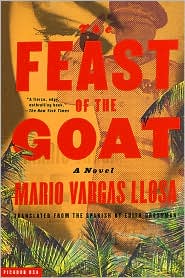
Category: Books
The Yacoubian Building
I had to write something about one of my favourite books of last year before I completely forgot about it. It’s already disappearing into the haze. Published in 2002, The Yacoubian Building by Alaa Al Aswany, printed in paperback (a gaudy purple cover) caught my eye. 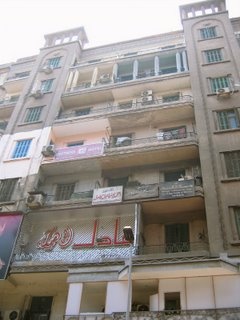 The real Yacoubian building in Cairo. I read plenty of foreign novels and for me it’s hard to remember all the names of the characters when so many names are repeated as second or third names of other characters. So I was grateful for the easymode of this novel – a small section at the beginning which spelt out a dozen or so main characters roles and relationship to each other. And what a bunch of believable people within. The delightfully hedonistic aged man who sought lustful pleasures with younger women against the wishes of his bitter phlegmatic sister. The disenchanted hardworking man of low caste (the son of a doorman!) who becomes an Islamic extremist; the corrupt, scheming businesman who buys a second wife and bids her to a secret existance; a distressed homosexual newspaper editor. This book has it all. Set around 1990, the writer makes regular comment on the changes/decline in Egyptian society over the past half century and uses the real life Yacoubian Building and it’s fall from prestige as a barometer for this. Corruption is everywhere and anything is willing to be overlooked – homosexuality anyone? if the price is right. Apparently the book broke new ground in this area for Arabic fiction. I didn’t realise that Cairo had been so influenced by the French and that it used to be a great deal more Western and secular than it is today. They made a movie of it in 2006. And a TV series. 4.5 stars.
The real Yacoubian building in Cairo. I read plenty of foreign novels and for me it’s hard to remember all the names of the characters when so many names are repeated as second or third names of other characters. So I was grateful for the easymode of this novel – a small section at the beginning which spelt out a dozen or so main characters roles and relationship to each other. And what a bunch of believable people within. The delightfully hedonistic aged man who sought lustful pleasures with younger women against the wishes of his bitter phlegmatic sister. The disenchanted hardworking man of low caste (the son of a doorman!) who becomes an Islamic extremist; the corrupt, scheming businesman who buys a second wife and bids her to a secret existance; a distressed homosexual newspaper editor. This book has it all. Set around 1990, the writer makes regular comment on the changes/decline in Egyptian society over the past half century and uses the real life Yacoubian Building and it’s fall from prestige as a barometer for this. Corruption is everywhere and anything is willing to be overlooked – homosexuality anyone? if the price is right. Apparently the book broke new ground in this area for Arabic fiction. I didn’t realise that Cairo had been so influenced by the French and that it used to be a great deal more Western and secular than it is today. They made a movie of it in 2006. And a TV series. 4.5 stars.
The beautiful screaming of pigs
Yes, looking at my steadily shrinking pile of to-read books, I picked out another short, sharp one from Galgut and read it in a couple of days. I wasn’t expecting much because this was his first novel, yet once again I was astounded by the sense of tension and unpredictability of his story. 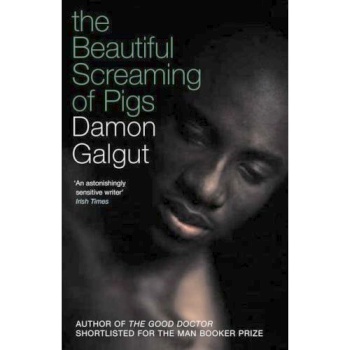 Describing equally his mother’s descent into yet another post-divorce relationship with a black activist to “find herself” and the upcoming Namibian independence elections, Galgut puts us right in the centre of his world. You can sense the heat, the isolation and the loneliness; the mysterious and unfathomable moods of locals. Only Coetzee has had this effect on me before, and coincidentally he is South African also. A great short novel. 4 stars.
Describing equally his mother’s descent into yet another post-divorce relationship with a black activist to “find herself” and the upcoming Namibian independence elections, Galgut puts us right in the centre of his world. You can sense the heat, the isolation and the loneliness; the mysterious and unfathomable moods of locals. Only Coetzee has had this effect on me before, and coincidentally he is South African also. A great short novel. 4 stars.
Jamaica
No, I’m not heading off there soon. Against all my normal instincts – i.e untried Australian author, no interest in the country itself, awful front cover, a stack of dialogue, I bought this and read it in a week, finishing tonight. I heard the writer on the radio – he’d won a Walkely Award for god’s sake. It was somehow irresistable. He talked about bonds between old schoolfriends, twenty years later, based on nothing but old memories. He talked about men wanting to fit in with or even compete with other men for status, money, sexual prowess. It just struck me as interesting. 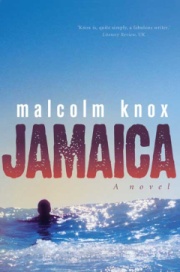 And the book was pretty interesting mostly. I never knew where it was going to go to next. The all-out bad guys were established early on, but no-one was good, they all had their secrets and their jealousies. And loathings. Unless I read it with not enough care, it didn’t seem to me to really resolve to anything. Baddies got some come-uppance. What looked like an awful tragedy about to happen was averted. Amazingly a relationship guaranteed to splinter into oblivion seemed to settle and show a light towards future changes. And pretty much the only revelation I noted was that the main character realised his dad was a prick. I like a novel where it’s not cut and dried, where nothing is super obvious, but with an ending like that, I’ve no idea how to rate it. Because it kept me page turning with uncommon urgency it rates a 4 stars.
And the book was pretty interesting mostly. I never knew where it was going to go to next. The all-out bad guys were established early on, but no-one was good, they all had their secrets and their jealousies. And loathings. Unless I read it with not enough care, it didn’t seem to me to really resolve to anything. Baddies got some come-uppance. What looked like an awful tragedy about to happen was averted. Amazingly a relationship guaranteed to splinter into oblivion seemed to settle and show a light towards future changes. And pretty much the only revelation I noted was that the main character realised his dad was a prick. I like a novel where it’s not cut and dried, where nothing is super obvious, but with an ending like that, I’ve no idea how to rate it. Because it kept me page turning with uncommon urgency it rates a 4 stars.
Palm Sunday
Before I forget completely, I finished a Vonnegut book last week – once again a (mostly) compelling page turner, except for the “and now here’s 10 pages about my family history” bits. He really is obsessed with Indianapolous and leaving some sort of legacy there. Written in 1981, the now-dead Vonnegut sprays a pile of lecture, acceptance speech and funeral speeches our way, which often leave me amazed with his daring and confidence. He says things about Americans that would be publically unacceptable today (i.e we’re closer to the definition of a communist nation than many other “commy” countries are) and his unique take on human misery is a delight (early humans got it right, we need to form large collective communities again – loneliness will bring about the downfall of Western society). 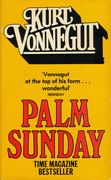 http://en.wikipedia.org/wiki/Palm_Sunday_(book) He makes some comments about his failed marriage, how his kids ended up turning out (I ended up putting Mark in the loony bin) and the curse of his utterly anti-religious heritage that made some things in his life inevitable. Writers like Vonnegut are satisfying to the voyeur in all of us as they reveal more than most. He even rates every one of his books with a school grade, giving Breakfast of Champions a C. What a crazy guy. I’m sure he would have been quite a handful to live (and work) with. Four stars.
http://en.wikipedia.org/wiki/Palm_Sunday_(book) He makes some comments about his failed marriage, how his kids ended up turning out (I ended up putting Mark in the loony bin) and the curse of his utterly anti-religious heritage that made some things in his life inevitable. Writers like Vonnegut are satisfying to the voyeur in all of us as they reveal more than most. He even rates every one of his books with a school grade, giving Breakfast of Champions a C. What a crazy guy. I’m sure he would have been quite a handful to live (and work) with. Four stars.
Am I really that fussy
Went to buy a book today and (this is going to expose me as a wanker of sorts but anyhow..) I was shocked by how badly so many books are packaged and fonted (is that a word?). Readers (or at least I) buy books for different reasons, and (shock horror) the story is not always #1 on my list. Otherwise I’d just download a scanned version from the internet (if I could work out where to go). No, I like it to look nice, smell nice and feel nice. And set a mood. That’s why I’ll never by an E-Book or whatever they’re called. Put (insert desired book here) in a large loopy font and doublespace it, add an acre of white space in the margins and make it so big and heavy that it will dent my sternum in bed, and I won’t buy it. I’ll buy instead the much-less-desirable-but-maybe-ok small paperback from another writer that fits in my bag instead. I’LL EVEN BUY IT FOR THE STUPID SOFTBACK PRICE YOU SILLY MARKETERS. We are not pensioners with eyesight problems. Much Australian published fiction is guilty of all the above. Just awful. So – completely unravelling my uncompromising stance here, today I broke down and bought a book I’d heard an author talk about on the radio a few week back. And I’m furious because in the age of beautifully decorated covers, it had a gaudy title and picture, and acres of white space. Publishing god, bring back the small paperbacks of the 80’s, your greatest fan lies in wait. And they stack nicely too.
The Inheritance of Loss
Ok. For once I cheated and looked up a book review before writing this. I just read last year’s Booker Prize winning novel in disjointed bouts on a daily tram – enjoyed it thoroughly, and then found I had nothing but emotional things to say about it. Hated the judge. Was annoyed by the idealism of the teacher. Felt sorry for the dog. Hoped for the illegal immigrant. That’s about as much as I get out of novels most times, and only after reading a half-decent review do you realise what you’ve missed.  Proper review here
Proper review here
So, it’s about the failure of multiculturism. About how globalism of industry isn’t making the world a better place. About self hatred. The alienation felt by people in strange lands. The humiliation of being poor. I loved it. It was surprisingly bitter and bleak despite the comical, fresh cover, and had an unexpected and unresolved ending – how un-Hollywood! I wonder what ever happened to Biju’s shoes? 4 stars.
My life as a fake
I don’t know what it is about Peter Carey – the sense of confidence he has, or my growing familiarity with his style, but I’m starting to go off him.
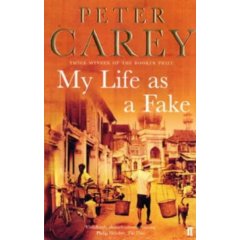
A couple of years ago I was enthralled by his Ned Kelly book and now we get this jumbled up familiar story (to Australians of a certain age) to wallow through. I have to admit to reading this in disjointed chunks, so it didn’t flow as it should, but the whole thing read like deja-vu and the self-conscious Australian references came across as contrived and annoying. 3.5 stars.
Auto Da Fe
Well, I just stopped midway through another book. And it was surprisingly easy this time. I’m beginning to see a pattern here – take one acknowledged classic, make sure it was written at least 50 years ago, make it a translation from another language, and make it over 400 pages, and it’s a surefire thing that I’ll abandon it. Even if it has all the hallmarks of the things I like most – no dialogue, obsessive characters, little plot.

So, goodbye Elias Canetti, I tried pretty hard to like your stuff. I know it was your only novel. I liked your deluded main character and his book obsession, and even his insane scheming wife. I found it hard to believe in the humpbacked chess-playing dwarf but I went with the flow. I liked how you made the world seem like it was closing in – trapping me and torturing me. It was nightmarish really. But, it was just too long and convoluted for me to follow. I give in.
What is the What
A few months ago, Kim found that Dave Eggers was coming to town to speak at the Melbourne International Writers Festival. They called it this a few years back because the (sometimes) desperate Arts crowd had lobbied the State Arts Minister for more validation that we are intellectually better than Sydney scum, by applying to UNESCO to become the world’s second City of Literature (the only one now is Edinburgh, Scotland).
Anyhow, back to Dave, whose other two books I have read and loved the first halves of, but found that they petered out a little near the end. Well, I ended up buying his latest “What is the What”, and it’s radically different from the other two. This one is a (largely) true story about a Sudanese refugee from the Darfur region, who endured unimaginable hazards to finally be accepted for migration to the U.S as one of a number of “Lost Boys” (orpans of the civil wars in Africa), due to efforts by celebrities like Jane Fonda and Ted Turner. 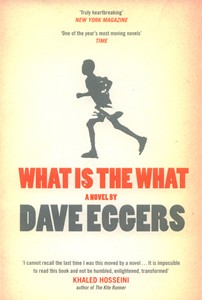
Apart from the shock value of much of the 10 year ordeal of Deng (including boys beside him being eaten by lions, or set on fire, or used as used as 11 year old soldiers by local militias), the book is unafraid to portray his difficult experiences and frustrations with modern day Atlanta also (hospital treatment, policing). Whilst he undoubtedly has a better life, he undergoes some depression after the loss of a girlfriend, and finds himself a little adrift.
It was an excellent read, and unfortunately on the night in question, I was tired and I missed seeing Eggers, who has been catapulted to fame, and now has a serious ongoing comittment to Sudanese causes and fundraising. His next book is on a similar topic. 4.5 stars.